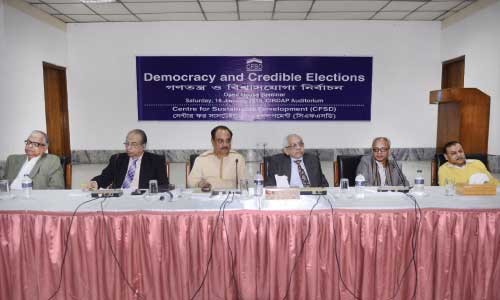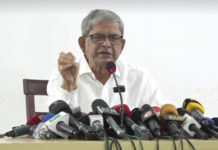Politicians, academics, journalists, lawyers and rights activists on Friday observed that democracy would not be established without credible and inclusive national polls although democracy was not all about elections.
At a seminar, they suggested that a mechanism should be developed so that democratic system in the country could be restored.
Given the experience of recent local government elections and the latest general elections held on January 5, 2014, they doubted if holding any credible elections was possible under the Awami League government.
Centre for Sustainable Development organised the open house seminar on Democracy and Credible elections at city’s CIRDAP auditorium with its president M Anwar Hashim in the chair. Former state minister for foreign affairs Abul Hasan Chowdhury and New Age editor Nurul Kabir delivered opening remark while centre secretary Mahfuz Ullah moderated the seminar.
About 25 people from different profession took part in the discussion and underscored the need for inclusive elections for the restoration of democracy in the country. They suggested that a mechanism should be developed so that democratic system in the country could be restored.
In the opening remark, former state minister for foreign affairs Abul Hasan Chowdhury said that all the political movements that finally led to the 1971 Liberation War were initiated for the establishment of democracy. ‘And for democracy elections is a must.’
He also said that every election traditionally gave a boost to the country’s economic and development activities, but such tradition was now missing.
Jatiya Samajtantrik Dal faction president ASM Abdur Rob, academic Mahbub Ullah, Socialist Party of Bangladesh convener Khalequzzaman, Former state minister for power and energy Iqbal Hasan Mahmood Tuku, former ambassador Shamsher Mobin Chowdhury, Bangladesh Nationalist Party leaders Ahmed Azam Khan and Shama Obaid, among others, took part in the discussion.
Rob said that freedom fighters fought for the independence in 1971 not to see the present political situation in the country as there was now no rights of the people to choose their representatives. ‘Procession and rallies is our tradition for all the movements…People prepared themselves for the Liberation War through joining processions and rallies, but now processions and rallies are now banned,’ he said.
Mahbub Ullah said that people needed an awakening at this moment as the nation was passing a critical time when most of the institutions helping in strengthening democratic practices had been destroyed.
He also said that the political parties who wanted to come to power should make it clear how they would restore democracy and rebuild the institutions.
Khalequzzaman said that the existing government had been continuously violating constitution and credible elections were impossible under the existing system. ‘Those who violates constitution cannot be democratic,’ he said,
Nurul Kabir said that defining democracy was primarily about sovereignty of the people and equality of the citizens irrespective of their ethnic, religious and gender identity. A society becomes democratic by assuring that all citizens enjoy equal rights and opportunities at all levels— political, economic and cultural, he added.
He also criticised the incumbent for behaving autocratically and censured the opposition parties for their failure to fight for the peoples’ cause. He said that there was no doubt that government had been extremely unpopular, but the people still did not get organised behind BNP because the party did not yet clearly tell the people how they would behave if voted to power.
Shamsher Mobin Chowdhury said that the electoral processes inside the political parties were still questionable and they should ensure democratic practice in their own party first and then ask whether the state had democracy or not.
Revolutionary Workers Party of Bangladesh secretary general Saiful Haque said that the necessity of the people’s revolution in current context was not a theoretical question but a question of reality.
He added that the true spirits of the Liberation War were social justice, equality and human dignity that have not reflected in the policies of the post liberation governments.
BNP leader Iqbal Hasan Mahmood Tuku said that credible election ensured the people’s rights as the government violated their rights arranging a flawed election on January 5, 2014. He suggested, ‘If we want to change the current complicated situation, we have to read the people’s pulse and raise our voice that can meet people’s desire.’
At a seminar, they suggested that a mechanism should be developed so that democratic system in the country could be restored.
Given the experience of recent local government elections and the latest general elections held on January 5, 2014, they doubted if holding any credible elections was possible under the Awami League government.
Centre for Sustainable Development organised the open house seminar on Democracy and Credible elections at city’s CIRDAP auditorium with its president M Anwar Hashim in the chair. Former state minister for foreign affairs Abul Hasan Chowdhury and New Age editor Nurul Kabir delivered opening remark while centre secretary Mahfuz Ullah moderated the seminar.
About 25 people from different profession took part in the discussion and underscored the need for inclusive elections for the restoration of democracy in the country. They suggested that a mechanism should be developed so that democratic system in the country could be restored.
In the opening remark, former state minister for foreign affairs Abul Hasan Chowdhury said that all the political movements that finally led to the 1971 Liberation War were initiated for the establishment of democracy. ‘And for democracy elections is a must.’
He also said that every election traditionally gave a boost to the country’s economic and development activities, but such tradition was now missing.
Jatiya Samajtantrik Dal faction president ASM Abdur Rob, academic Mahbub Ullah, Socialist Party of Bangladesh convener Khalequzzaman, Former state minister for power and energy Iqbal Hasan Mahmood Tuku, former ambassador Shamsher Mobin Chowdhury, Bangladesh Nationalist Party leaders Ahmed Azam Khan and Shama Obaid, among others, took part in the discussion.
Rob said that freedom fighters fought for the independence in 1971 not to see the present political situation in the country as there was now no rights of the people to choose their representatives. ‘Procession and rallies is our tradition for all the movements…People prepared themselves for the Liberation War through joining processions and rallies, but now processions and rallies are now banned,’ he said.
Mahbub Ullah said that people needed an awakening at this moment as the nation was passing a critical time when most of the institutions helping in strengthening democratic practices had been destroyed.
He also said that the political parties who wanted to come to power should make it clear how they would restore democracy and rebuild the institutions.
Khalequzzaman said that the existing government had been continuously violating constitution and credible elections were impossible under the existing system. ‘Those who violates constitution cannot be democratic,’ he said,
Nurul Kabir said that defining democracy was primarily about sovereignty of the people and equality of the citizens irrespective of their ethnic, religious and gender identity. A society becomes democratic by assuring that all citizens enjoy equal rights and opportunities at all levels— political, economic and cultural, he added.
He also criticised the incumbent for behaving autocratically and censured the opposition parties for their failure to fight for the peoples’ cause. He said that there was no doubt that government had been extremely unpopular, but the people still did not get organised behind BNP because the party did not yet clearly tell the people how they would behave if voted to power.
Shamsher Mobin Chowdhury said that the electoral processes inside the political parties were still questionable and they should ensure democratic practice in their own party first and then ask whether the state had democracy or not.
Revolutionary Workers Party of Bangladesh secretary general Saiful Haque said that the necessity of the people’s revolution in current context was not a theoretical question but a question of reality.
He added that the true spirits of the Liberation War were social justice, equality and human dignity that have not reflected in the policies of the post liberation governments.
BNP leader Iqbal Hasan Mahmood Tuku said that credible election ensured the people’s rights as the government violated their rights arranging a flawed election on January 5, 2014. He suggested, ‘If we want to change the current complicated situation, we have to read the people’s pulse and raise our voice that can meet people’s desire.’
Source: New Age










